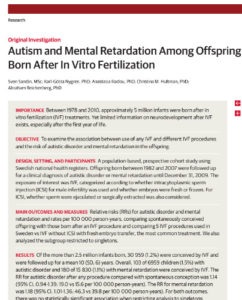Florida IVF Doctor Reviews New Report on IVF Risks
A recent article published in JAMA (July 2013), Autism and Mental Retardation Among Offspring After In Vitro Fertilization by Sven Saudin et al., reminds us that most well done assessments have shown that the observed problems are most likely the result of the genetics of the patients being treated and not due to the IVF treatment. Humans have a risk of congenital problems that is in the range of 3-4%. These congenital problems may be as minor as a mole or as severe as a major heart defect. The 3-4% risk of congenital anomalies is seen in a fertile population while infertility patients may expect the risk of congenital anomalies to be almost twice that even if a spontaneous conception occurs after prolonged sub-fertility.
As a Florida IVF Doctor, I find this recent report by Saudin et al (JAMA July 2013) very interesting. He evaluated Swedish infants born between 1982-2007 for the incidence of autism or mental retardation. They compared the incidence of these conditions in children conceived with IVF as compared to children born after spontaneous conception. In my opinion, this is the greatest limitation of this study and many others that attempt to see if the IVF procedures are a cause of congenital anomalies or developmental problems.
Studies are flawed because these problems may be inherent to the infertile population or the multiple pregnancy itself and not the IVF procedures. An example of this type of problem was seen a few years ago when there was a scare about whether IVF procedures were “causing” and increase in the risk of genetic imprinting disorders like the Angelman syndrome. A follow up study evaluated the incidence of these conditions in the infertile or subfertile population that eventually conceived without IVF found that the conditions had the same incidence in the subfertile population whether they were treated with IVF or not.
Machelle L. Cedars, M.D. is Professor and Director of the UCSF Women’s Health Clinical Research Center. He wrote an editorial in the same issue of JAMA. I include some of his comments about this recent report:
“Prior studies have been largely reassuring regarding the risk of autism following IVF. Most of these studies have come from the Scandinavian countries where country-wide databases and registries provide populations for study and linkage with important aspects of both the exposures and outcomes of interest. However, these studies have been compromised by relatively small sample sizes, poorly characterized outcomes of interest, and limited specific details about IVF and the associated procedures.”
“The results of the study support the absence of an association between any IVF procedure and autistic disorder compared with spontaneous conception.”
Although the authors found a small risk of mental retardation following IVF compared with spontaneous pregnancies (RR, 1.18 [95% CI, 1.01- 1.36]; 46.3 vs 39.8 per 100 000 person-years), this increase became insignificant when only evaluating singleton births.”
“The association of multiple birth and preterm birth with these outcomes is particularly important because decreasing the number of multiple births is a primary goal of assisted reproductive technology.”
“The increased risk of autistic disorder and mental retardation, largely accounted for by multiple pregnancies and preterm delivery, should provide another opportunity for reproductive health physicians to educate patients and other physicians about the importance of limiting embryo transfer number.”
“It is somewhat reassuring that the preliminary analyses in the current study failed to show an association with either assessed outcome and day 5 embryo culture.”
“Because ICSI is often used for male-factor infertility and is considered more invasive, it is of particular interest. The study by Sandin et al found an association between ICSI and mental retardation (RR, 1.51 [95% CI, 1.10-2.09]; 93.5 vs 61.8 per 100 000 person-years). However, similar to other outcomes, this relationship became insignificant in singletons.”
“The indication for ICSI in many of the studies with identified risk has been severe male-factor infertility. Very low sperm counts and sperm defects are frequently associated with paternal factors including increased genetic risk.”
“A recent study supports the concept that intrinsic genetic abnormalities of sperm may be a source of identified risk with ICSI in cases of very low sperm counts.”
We need to continue to evaluate these issues. One fact is exceedingly clear. We need to continue to do our best to avoid multiple pregnancies. Recent technological advances with more reliable genetic evaluation of the embryos may make a significant difference in reducing the risk of a multiple pregnancy, the most obvious risk factor for potential morbidity.
Julio E. Pabon, M.D., F.A.C.O.G., July 4, 2013
Medical and Laboratory Director
Fertility Center and Applied Genetics of Florida
Sarasota and Bonita Springs, Florida
www.geneticsandfertility.com



